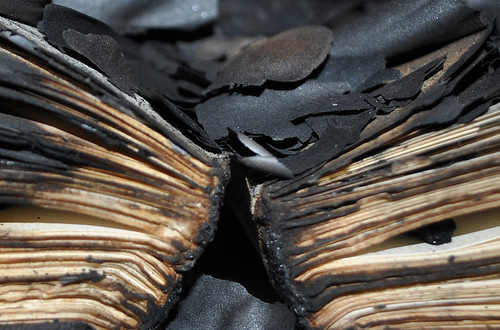By Nick Ubels (The Cascade) – Email
Print Edition: February 8, 2012
Under the humming glare of incandescent lights, browsing the local bookstore, I encounter an end-cap display of paperbacks painted black, red and occasionally this weird yellow colour, stamped with titles like Vampire for your Love and Grodenia: Princess of the Dark in uniformly ghoulish type settings. A few aisles later, I see hundreds of legal thrillers whose covers bear James Patterson’s name, embossed in big, gold letters. I could go on, describing row after row of shitty romance and true crime books – trite, commercial exercises devoid of substance, feeling, or originality. It’s almost enough to make you want to give up on the whole enterprise.
In last week’s issue, Leanna Pankratz argued that there is nothing new in literature, that great authors simply vanished at the end of the 1990s. While I can understand the despair and listlessness a perusal of any bookstore’s New Release section can often inspire, I believe there is hope.
While the bulk of post-millennial literature may not compare to Salinger or Joyce or Dickens, neither did the majority of books filling out shelves next to theirs during their own lifetimes. Pulp paperbacks are not a recent phenomenon. The Da Vinci Code pales in comparison to The Catcher in the Rye, but was it ever a fair fight?
It’s relatively easy to look back on previous eras of art to find the cream of the crop, the enduring works that have outlasted their peers to become the canon. And sure, the last decade can hardly compete with the best of 1000 years of English literature, but that’s to be expected. Taken on a decade-by-decade basis, the aughts have produced some truly memorable work. As an English student who spends most of his reading time working with the canon, I realize my familiarity with contemporary literature is somewhat limited, but authors like Erik Larson, David Foster Wallace, Dave Eggers, Cormac McCarthy, Zadie Smith, and Malcolm Gladwell have produced work in the last decade that has stuck with me. I’ve seen an explosion of creative energy directed towards non-fiction, graphic novels, and genre-bending. It’s also worth noting that new media for storytelling has scattered our generation’s best writers across film and television among other forms. And that’s just a small selection of great work that has found popular success; we must remember that critical consensus often takes a long time to develop.
The following passage is excerpted from “The Critic as Artist,” a dialogue by Oscar Wilde, one of the authors cited in last week’s article:
ERNEST: But what is the difference between literature and journalism?
GILBERT: Oh! Journalism is unreadable and literature is not read.
The irony of printing this quote in a student newspaper is not lost on me, but I’d like to focus on the second part of what Wilde wrote, “Literature is not read.” History is kind to great artists, but they are often neglected by their contemporaries and left to languish in obscurity until long after their deaths, whenever it is deemed appropriate for future scholars to venerate their life’s work.
It’s safe to heap further praise on works that have already achieved critical consensus, but one of the joys of reading is the process of discovery. There’s something invigorating about approaching a novel with an open mind. If we don’t give anything new a chance, we deprive ourselves of the opportunity to find something fresh and moving and original. Sure, it might require sifting through stack after stack of utter dreck, but doesn’t that make it that much sweeter when you finally come across something memorable?


